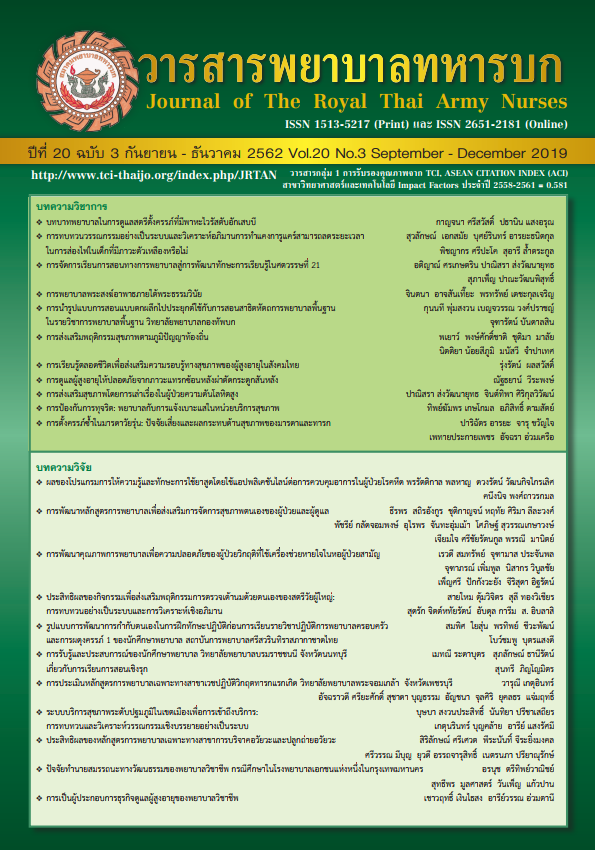An evaluation of nursing specialty in neonatal critical care nurse practitioner, Prachomklao College of Nursing, Phetchaburi province
Keywords:
An evaluation, Nursing specialty, Neonatal critical care nurse practitioner, Prachomklao College of Nursing, Phetchaburi provinceAbstract
This study aimed to evaluate program of nursing specialty in neonatal critical care nurse practitioner. The researcher focused on evaluating context, input, process, product, and impact. The participants were 75 graduates of the program in neonatal critical care nurse practitioner batch 1-3, and 20 head nurses or colleagues of neonatal critical care nurse practitioner. Two validated questionnaires and semi-structure interview were used for data collection. They were validated by 3 experts with the reliability of Cronbach’s Alpha coefficient 0.89. The data were analyzed by using descriptive statistics and content analysis.
The results revealed that the graduates’ batch 1 and 3 evaluated the input, process, and product of the nursing specialty in neonatal critical care nurse practitioner being appropriated at the high level ( = 4.40, SD = .622;
= 4.27, SD = .701;
= 4.01, SD = .595 and
= 4.22, SD = .567 respectively). However, the graduates’ batch 2 evaluated the context and product at the highest level. The overall mean scores of perceptions about neonatal critical care nurse practitioner competencies were at a high level (
= 3.15, SD = .472). Considering in each dimension, the result of the study showed that the highest mean score was the technology, innovation and research ( = 3.35, SD = .508). However, head nurses or colleagues of neonatal critical care nurse practitioner evaluated neonatal critical care nurse practitioner competencies were at a highest level (
= 3.51, SD = .376). The technology, innovation and research dimension was the highest mean score (
= 3.56, SD = .417).
The overall program evaluation was in high level. However, the participants suggested about provide more details via website, adding topic calculate calories and should test immunity before going to practicum and practice setting respirator skill. The course manager should take the evaluation results into account for proper improvement.
Downloads
References
2. Health service system development committee in newborn. Guideline to improve health service system development committee in newborn. Bangkok: The federation; of saving and service cooperatives of Thailand limited printing; 2013. (in Thai).
3. Wangruangsatid R, Thongrat Y, Wanchai A, Rangsiyanon J. Perceived neonatal critical care nurse practitioner competencies of trainees completing the neonatal critical care nurse practitioner program. Journal of Nursing and
Health Care Science. 2017; 35(4):185-193. (in Thai).
4. Watcharaach J, Meelai W, Pitaksil A., kampang P. Competency in critical neonatal care of professional nurses,Health Service Provider Board Office 6, Ministry of Public Health. Journal of Health Science Research 2017: 11(1),99-109. (in Thai).
5. Prachomklao College of Nursing, Phetchaburi province. Program of nursing specialty in neonatal critical care nurse practitioner. Phetchaburi: Prachomklao College of Nursing, Phetchaburi province; 2015 (in Thai).
6. Taba H. Curriculum development. New York: Harcourt, Brace & World. Tyler, R. W. Basic principles of curriculum and instruction. Chicago: The university of Chicago press; 1962.
7. Thanomsak T. The development of self-evaluation system on school based curriculum at elementary education level. (Dissertation). Thailand. Srinakharinthawirot University; 2017. (in Thai).
8. Stufflebeam D, Shinkfield A. Evaluation Theory, Models, and Applications. San Francisco: Jossey-Bass; 2007.
9. Soowit B, Thummak S, Lhaosupab N, Pitagsavaragon P. An evaluation of emergency medical service nursing course of Kuakarun Faculty of Nursing, Navamindradhiraj University. Journal of The Royal Thai Army Nurses. 2015; 16(2): 41-47. (in Thai).
10. Onsri P, Wacharagate S, Kulpakdee, R. An evaluation of the nursing specialty in nursing administration program at the Royal Thai Army Nursing College. Journal of The Royal Thai Army Nurses. 2014; 15(3): 342- 352. (in Thai).
11. Arpanantikul M, Prapaipanich W, Senadisai S, Orathai P. Nursing Administrators’ Perception of Thai Registered Nurses’ Professional Ethics. Thai Journal of Nursing Council. 2017;29 (2), 5-20. (in Thai).
12. Hanyut O, Wongsomlee C. Ethical Behavior for Professional Nurses. Journal of the Royal Thai Army Nurses. 2018; 19(3): 33-37. (in Thai).
13. Thai Nursing Council. Document no.7: Scope and competency for special nurses. (Mimeographed). Core competency of special nurses and needed special program workshop 27-28 Nov. Nonthaburi: Thai Nursing Council;
2014. (in Thai).
14. Thai Nursing Council. Ethics promotion guideline for nursing organizations: Mechanisms and practices. Nonthaburi: Golden Point Company; 2016. (in Thai).
15. Wangruangsatid R, Thongrat Y, Wanchai A. The study of colleague’s satisfaction on neonatal critical care nurse practitioner. Journal of The Royal Thai Army Nurses. 2017; 18(3):123-133. (in Thai).
Downloads
Published
How to Cite
Issue
Section
License
บทความหรือข้อคิดเห็นใดใดที่ปรากฏในวารสารพยาบาลทหารบกเป็นวรรณกรรมของผู้เขียน ซึ่งบรรณาธิการหรือสมาคมพยาบาลทหารบก ไม่จำเป็นต้องเห็นด้วย
บทความที่ได้รับการตีพิมพ์เป็นลิขสิทธิ์ของวารสารพยาบาลทหารบก
The ideas and opinions expressed in the Journal of The Royal Thai Army Nurses are those of the authors and not necessarily those
of the editor or Royal Thai Army Nurses Association.






